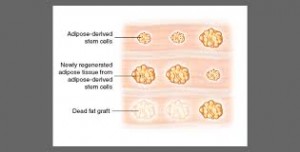
While these fat grafting survival theories may seem relatively new, they were initially proposed over fifty years ago. In the book Transplantation of Tissue Volume II (1959), Lyndon Peer in his chapter Part IV. Fat writes ‘The two conflicting theories regarding the fate of free fat grafts as this author’s hypothesis of cell survival as opposed to the hypothesis of host tissue replacement. The available evidence at this time seems to support the survival theory; certain durable adipose cells in free transplants survive and it is these cells which constitute the adipose tissue eventually remaining in the transplantation site’.
It is important to put into perspective that the only known method fat grafting back in Peer’s day was a dermal-fat or whole fat transplant. That is quite different today where the main method of fat grafting is by liposuction harvest and injection. It is more likely that particulated liposuctioned grafts require a greater contribution from host cell replacement, particularly from that induced by stem cells that are located throughout fat tissue.
While the techniques in fat grafting have come a long way in the past fifty years, our understanding of exactly how it works (or doesn’t work) has not come quite as far.
Dr. Barry Eppley
Indianapolis, Indiana


